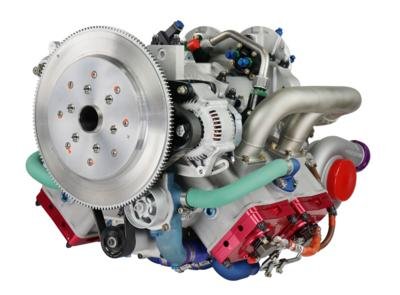Sat, Nov 18, 2023
2-Stroke Engine Tech May Prove Decisive Edge Against Legacy ICE Engine Designs
DeltaHawk Engines has completed the simulation analysis of a new hydrogen-powered variant of its proven engine family.

The testing evidently proved promising enough to move forward into real-world prototyping, using the brand's "highly adaptable engine architecture" with a range of up-and-coming hydrogen fuels. DeltaHawk sees their current design as an excellent host for next-gen sustainable power, offering "reduced development costs and time to market, as well as higher durability and cost effectiveness due to its more mature technology." On top of that, the brand says their engine design has a "significantly reduced power degradation curve over time compared to current fuel cell technology", which grants "better fuel economy than fuel cells after the initial period."
If successful, it will all result in a compact, lightweight, durable 2-stroke based hydrogen engine. DeltaHawk's simulations led them to believe they have an edge over other competing manufacturers using their own 4-stroke engine architectures - seeing a resurgent, dying engine tech become the face of futuristic engine tech is a fun twist of fate, if nothing else. The completed engine is expected to reap some of the governmental benefits of addressing their desire for hydrogen power in trucking, delivery, and military applications.
“Environmental responsibility is a foundational pillar of our company” said Christopher Ruud, Chief Executive Officer of DeltaHawk. “In the general aviation industry, our family of engines are creating a highly reduced net carbon footprint coupled with airborne lead removal, thanks in large part to their fuel efficiency and capability to burn next generation sustainable aviation fuels (SAF). Now, with our planned ability to expand our engine family to include variants that will utilize hydrogen fuel in aviation, commercial and military applications, we’ve taken another major step toward environmental sustainability, climate neutrality and a zero emissions future.”
More News
Its Offerings Are Lighter, Cleaner, and Now Pushing Past 1,000nm on SAF Jet Fuel DeltaHawk’s diesel-powered aircraft lineup has seen incredible upgrades over the last few yea>[...]
The Airplane Experienced A Total Loss Of Engine Power On December 3, 2025, about 1600 central standard time, a Mooney Aircraft Corp. M20K, N57229, was substantially damaged when it>[...]
Make Sure You NEVER Miss A New Story From Aero-News Network Do you ever feel like you never see posts from a certain person or page on Facebook or Instagram? Here’s how you c>[...]
Aero Linx: European Society of Aerospace Medicine (ESAM) As a pan-European, independent forum, it works to promote the safety and health of all persons involved in aviation and spa>[...]
“We are excited to see Wisk achieve this milestone, and I’m so proud of the team that made it possible. The team at Wisk has built advanced technologies across flight c>[...]
 Aero-TV: DeltaHawks Diesel Power Steps Into the Spotlight
Aero-TV: DeltaHawks Diesel Power Steps Into the Spotlight NTSB Prelim: Mooney Aircraft Corp. M20K
NTSB Prelim: Mooney Aircraft Corp. M20K ANN FAQ: Turn On Post Notifications
ANN FAQ: Turn On Post Notifications ANN's Daily Aero-Linx (12.20.25)
ANN's Daily Aero-Linx (12.20.25) Aero-News: Quote of the Day (12.20.25)
Aero-News: Quote of the Day (12.20.25)



